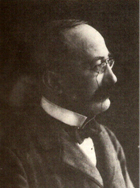The Morselli Medal is awarded every two years by the International Academy for Suicide Research (IASR) to an individual who has made an outstanding and important lifetime contribution to the study of suicidal behaviour and/or suicide prevention. This is the Academy’s most distinguished award and is intended to be a “lifetime achievement” award. The Award is named in honour of Enrico Morselli, late of the University of Genoa School of Medicine who is regarded as being the first scientific, statistically informed epidemiologist in suicidology.
Selection procedures
The President of IASR shall appoint the Chair of the Research Awards Committee.
The Selection Committee shall consist of the current president of IASR, the immediate Past-President and the President-Elect.
A nominee may not serve on the Selection Committee. In the event that any or some of the Selection Committee are nominated for the Morselli Award, The Chair may co-opt to the Selection Committee additional members (for example previous presidents of the IASR) at his or her discretion to replace those nominated. Nominations for the Morselli Medal may be made by any member of IASR to the Chair of the Morselli Medal Committee.
Nominees do not necessarily have to be IASR members.
The nomination must include a letter of support stipulating why the nominee is deserving of the award, and providing a detailed description of the nominee’s work and achievements in suicide studies.
The Chair ensures that the results of the selection are reported to the Board of IASR.
Award
The Award shall consist of a medal, the Morselli Medal.

Morselli Medal Recipients
- 2023 Gregory Brown
- 2023 Barbara Stanley
- 2021 Danuta Wasserman
- 2021 Gustavo Turecki
- 2019 Robert Goldney
- 2019 Yeates Conwell
- 2017 Victoria Arango
- 2017 Diego De Leo
- 2015 David Brent
- 2015 Mark Williams
- 2013 Keith Hawton
- 2013 Marsha Linehan
- 2010 J. John Mann
- 2007 Norman Farberow
- 2007 Edwin Shneidman
- 2005 Aaron Beck
- 2003 Marie Åsberg
Background History

The Academy’s most distinguished award is the Morselli Medal, named after Enrico Morselli, late of the University of Genoa School of Medicine. Morselli is credited with the first exhaustive application of statistical and epidemiological methods to the study of suicide. His work, represented in a massive treatise published in 1879, anticipated by eighteen years, the much better known Suicide: A Study in Sociology by Emil Durkheim, which did not appear until 1897. Morselli was therefore the first scientific, statistically informed epidemiologist in suicidology.
In his treatise Morselli addressed the influence of increasing social complexity on suicide, as well as the influence of individual biological and social circumstances, suicidal methods, and treatment of suicidal patients. He emphasized the importance of mental anguish as a major factor in suicide.
He published about 146 papers in the field of psychiatry, 42 in scientific philosophy, 72 in anthropology, 63 in medicine and neuropathology, 60 in psychology, 60 in forensic psychiatry and legal medicine, and 50 on sociological and educational questions. Morselli was the first to describe what we now know as body dysmorphic disorder and he coined the term dysmorphophobia. He was interested in questions of euthanasia. Like many other scholars of his time, he also concerned himself with psychic research.
The Morselli Medal was first awarded in 2003 and the first recipient of the medal was Marie Asberg of Sweden in recognition of her pioneering contribution to the biology of suicidal behaviour. The second recipient in 2005 was Aaron Beck who received his medal for his lifetime contribution in developing cognitive therapy as an effective treatment for psychological disorders.
